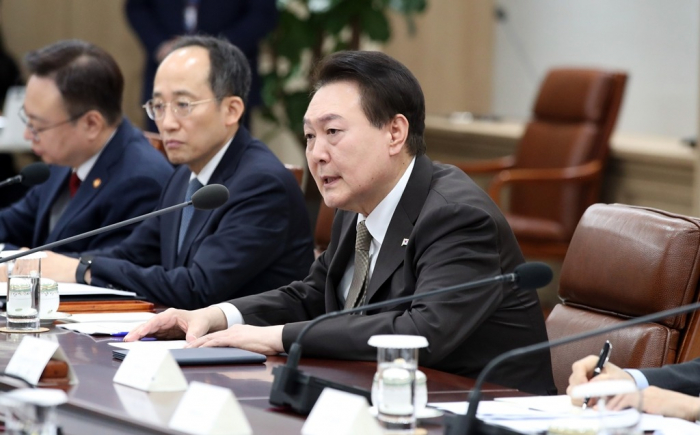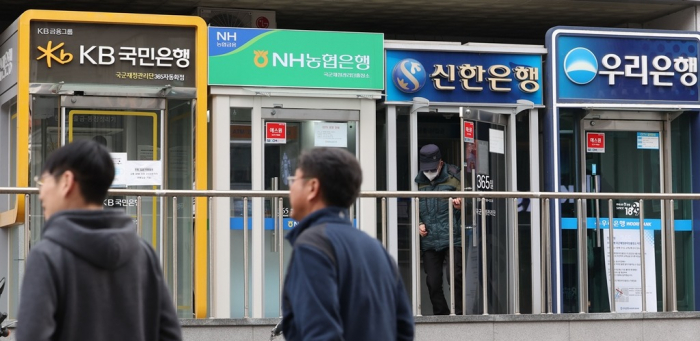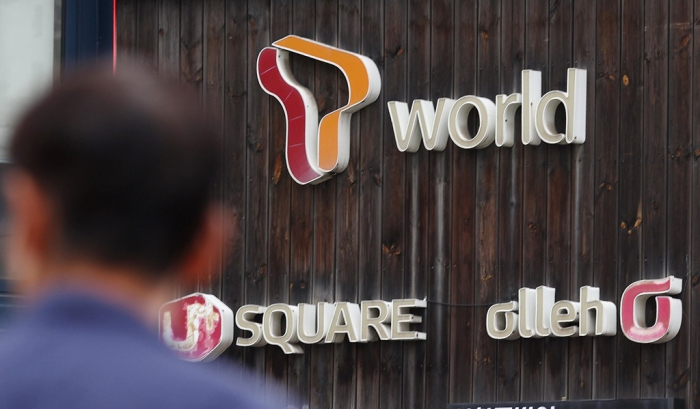Business & Politics
Korea's Yoon presses banking, telecom sectors over inflation
The FSC will overhaul the banking sector's oligopoly, while the Ministry of Science and ICT seeks to diversify telecom service plans
By Feb 15, 2023 (Gmt+09:00)
3
Min read
Most Read
LG Chem to sell water filter business to Glenwood PE for $692 million


Kyobo Life poised to buy Japan’s SBI Group-owned savings bank


KT&G eyes overseas M&A after rejecting activist fund's offer


StockX in merger talks with Naver’s online reseller Kream


Mirae Asset to be named Korea Post’s core real estate fund operator



South Korean President Yoon Suk-yeol on Wednesday called for measures to stabilize mounting price pressure caused by "oligopolies" in the banking and telecommunication sectors in a bid to ease inflation in Asia’s fourth-largest economy.
“The financial and telecommunication sectors, whose services are regarded as public property, maintain the form of oligopolies in terms of government patents,” Yoon said at a meeting of economy ministers to discuss how to tackle cost-of-living pressure.
“The banking sector’s oligopoly has caused significant damage,” Yoon said, citing criticism that banks easily make profits by taking advantage of their dominant positions in the industry when they determine interest rates on loans.
Yoon ordered financial regulators to come up with measures to effectively improve the competition system in the sector.
He asked for similar steps for the telecommunication industry.
“Yoon instructed to prepare for steps to enhance competition considering all alternatives in the telecommunication sector, which three major carries have been dominating since 2001,” Choi Sang-mok, senior presidential secretary for economic affairs, told a press briefing, referring to SK Telecom Co., KT Corp. and LG Uplus Corp.
South Korea’s consumer inflation accelerated to 5.2% in January, reversing its slowdown in the past two months. But the central bank is unlikely to tighten monetary policy as aggressively as before as the economy is expected to head for a recession for the first time in three years.
CHALLENGER BANKS IN SOUTH KOREA
Financial Supervisory Service (FSS) Governor Lee Bokhyun already instructed the regulator’s executives to consider measures to change the oligopolistic system centered on five major lenders – KB Kookmin Bank, Shinhan Bank, Woori Bank, Hana Bank and NongHyup Bank – to a full and fair competition system.
“The five banks’ high market shares allow them to enjoy oligopoly games when pricing,” said a senior FSS official. “Only a full competition with new participants will enable efficient pricing and reduce loan-deposit margins,” he said, referring to the difference between interest rates on loans and those on deposits.
The five banks reportedly account for 77% of the country’s total deposits and 67% of its loans.

The FSS was known to consider a similar system with challenger banks in the UK. They recently created small banks that compete with traditional major lenders such as Barclays. Challenger banks distinguish themselves from the longer-established players through modern financial technology practices such as online-only operations.
The UK issued licenses to some 50 new banks as criticism grew over the country’s top four lenders including Barclays, HSBC, Lloyds Banking Group and NatWest Group following the 2008-09 global financial crisis.
Some of the challenger banks have made significant achievements. Virgin Money, for example, made up 3.4% of the UK’s mortgage loan market, compared with 15.6% of the leader Lloyds.
The FSS is also mulling the segmentation of approval units. Currently, the country issues a single license for all banking services.
The measure to nurture competitive banks in specific sectors is expected to create special banks such as those only for small and medium-sized enterprises (SMEs), as well as banks specializing in retail and wholesale industries, expanding consumer choice.
AN ADDITIONAL 30 GB FREE DATA IN MARCH
South Korean telecommunication carriers unveiled measures to meet the government’s call to ease price pressure.
SK Telecom, KT and LG Uplus decided to provide an additional 30 gigabytes (GB) of data for free in March to subscribers who are older than 19. About 67% of total subscribers are expected to benefit from the steps.

The government is seeking fundamental solutions to ease price pressure from telecommunication bills as the carriers’ offer is temporary.
The Ministry of Science and ICT plans to discuss the diversification of service plans with those telcos in an aim to urge them to launch 40 GB-100 GB data plans, which the current billing system does not cover.
In addition, the ministry is seeking telecommunication plans for seniors, which provide 30% more services at cheaper costs.
Write to Jung-hwan Hwang, Ho-Gi Lee and Bo-Hyung Kim at jung@hankyung.com
Jongwoo Cheon edited this article.
More to Read
-
 EconomyTreasury yield falls signal BOK's looser grip on inflation
EconomyTreasury yield falls signal BOK's looser grip on inflationFeb 13, 2023 (Gmt+09:00)
3 Min read -
 EconomyKorea’s inflation picks up 5.2% in January on high utility prices
EconomyKorea’s inflation picks up 5.2% in January on high utility pricesFeb 02, 2023 (Gmt+09:00)
3 Min read -
 EconomyS.Korea likely to suffer recession as Jan exports tumble
EconomyS.Korea likely to suffer recession as Jan exports tumbleFeb 01, 2023 (Gmt+09:00)
3 Min read -
 EarningsKorean banks log record profits on rising interest rates
EarningsKorean banks log record profits on rising interest ratesOct 25, 2022 (Gmt+09:00)
3 Min read
Comment 0
LOG IN


